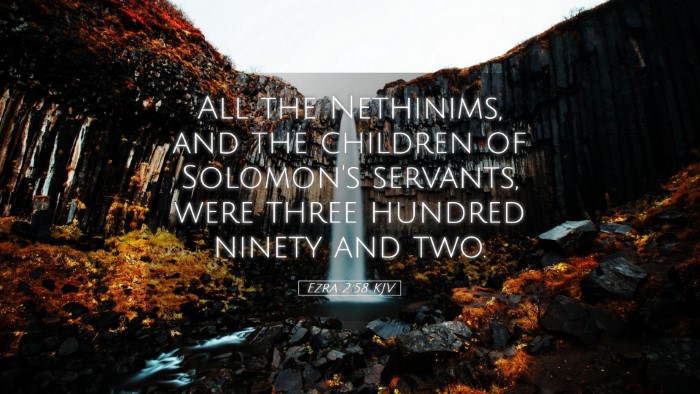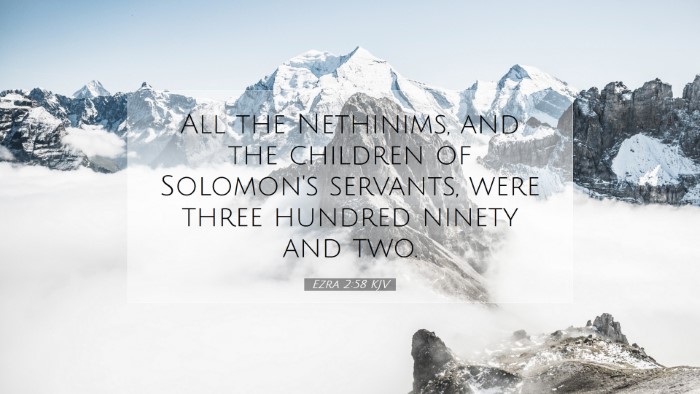Ezra 2:58 Commentary
Verse: Ezra 2:58 - "All the Nethinim, and the children of Solomon's servants, were three hundred ninety and two."
Introduction
The passage in Ezra 2:58 presents a census that identifies the Nethinim and the children of Solomon's servants who returned to Jerusalem after exile. This verse may seem straightforward, yet it carries profound significance within the context of the restoration of Israel after the Babylonian captivity. Through the insights derived from Matthew Henry, Albert Barnes, and Adam Clarke, we can glean deeper theological implications and practical applications from this seemingly simple enumeration.
Historical Context
The book of Ezra recounts the return of the Israelites to their homeland following a prolonged period of captivity. The Nethinim were temple servants, consecrated for service within the temple. Their inclusion reflects the restructuring of community roles and the rebuilding of worship practices essential for the restoration of Israelite society. Understanding this historical backdrop helps in grasping the importance of the group counted in this verse.
Commentary Insights
Matthew Henry's Perspective
Matthew Henry emphasizes the significance of the Nethinim, stating that their presence and participation in the restoration remind us of the need for service in the house of God. These temple servants, although often regarded as lower in societal status, played a crucial role in facilitating the religious life of Israel. Henry points out that their inclusion in the census is indicative of God's provision for every aspect of temple worship, asserting that no position in God's plan is insignificant.
Albert Barnes' Exegesis
Albert Barnes focuses on the demographic aspect of this verse, noting that the number of Nethinim alongside Solomon's servants is a reminder of the continuity of Israel's heritage. He comments that the mention of Solomon's servants indicates a historical connection to the glory days of Israel. Moreover, Barnes elaborates on how these figures serve as a testament to God's enduring covenant, demonstrating that even after exile, God preserved a remnant of His people to fulfill His promises.
Adam Clarke's Commentary
Adam Clarke delves into the nature of the Nethinim, suggesting that they were likely the descendants of the Gibeonites, who had been made servants of the sanctuary. Clarke expresses the idea that their faithful return exemplifies the principle of restoration and repentance. He argues that their involvement was essential for the re-establishment of the worship system in Jerusalem, which had a profound theological undertone, emphasizing that every believer has a role in God's redemptive plan.
Theological Implications
The mention of the Nethinim and Solomon's servants brings forth several theological themes:
- Service in God's Kingdom: The principle that everyone has a role in God's kingdom is vital. It undermines the notion of hierarchy in ministry, illustrating that all contributions are valuable.
- Restoration and Redemption: The act of returning signifies not just a physical relocation but a spiritual restoration. It speaks to God's faithfulness in restoring His people to Himself.
- Historical Continuity: The continuity of the community and its history is portrayed through the lineage of these servants, affirming God's covenant with Israel through their survival and return.
- The Inclusivity of God’s Plan: The participation of those considered marginal servants illustrates the inclusive nature of divine grace, suggesting that all are invited to partake in the work of the Kingdom.
Practical Applications
As pastors and theologians reflect on Ezra 2:58, several practical applications can be drawn:
- Embrace Every Role: Church leaders should encourage congregants in all roles, emphasizing that every contribution enhances the worship and functioning of the body of Christ.
- Fostering Community: There is a need to acknowledge the diverse backgrounds and roles within the church, fostering a sense of belonging and unity among all believers.
- Encouragement towards Service: Believers should be challenged to see their involvement in church ministries as a significant form of worship and dedication to God.
- Highlighting Restoration Stories: Testimonies of personal restoration should be shared within congregations, illustrating how God’s grace transforms lives, akin to the restoration of Israel.
Conclusion
In summary, Ezra 2:58 serves as both a historical record and a theological reflection on the role of the Nethinim and Solomon's servants during Israel's return from exile. Commentaries by Matthew Henry, Albert Barnes, and Adam Clarke reveal the depth and significance of this passage. By examining the roles of these returning servants, we are reminded of our collective responsibility in the kingdom and the inclusive nature of God’s redemptive work. As we apply these lessons today, may we honor every believer's contribution to the body of Christ, acknowledging that small roles can have monumental impacts on God's work on earth.


